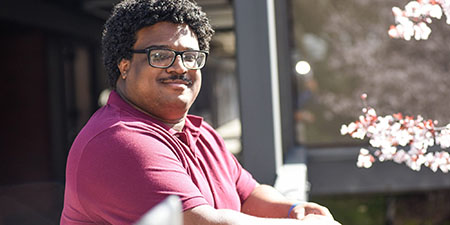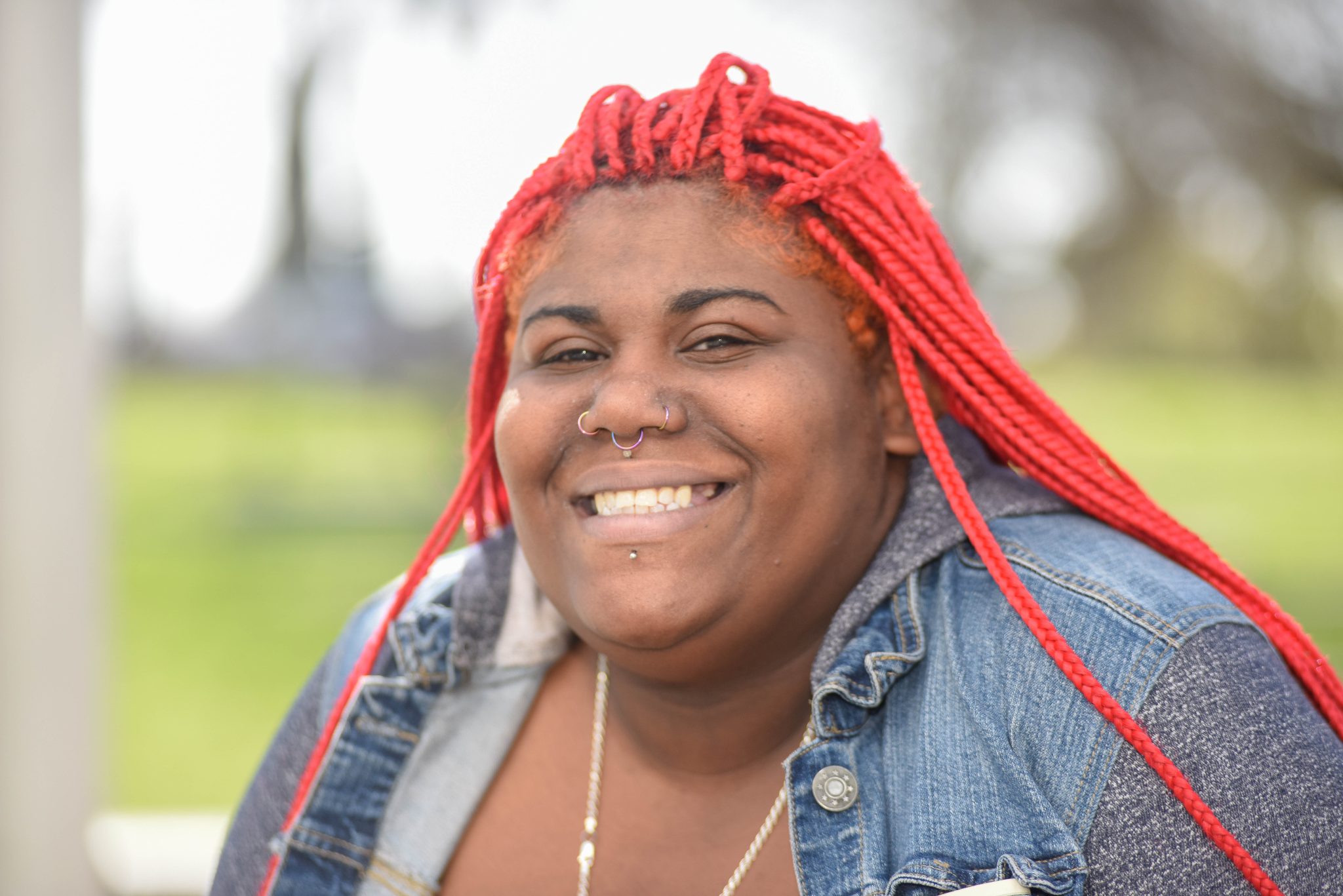DVC Champions Belonging, Belief, and Success for Foster Youth
Jul 31, 2024

“After high school, I took a year off to work. I had been dealing with a lot from when I was little. I also wondered if school was for me because everyone in my family had dropped out of college or didn’t go at all,” said Imani Gordon.
Gordon later enrolled at DVC to earn an associate in arts degree in animation. He had learned about DVC’s foster youth program while in high school, so he met with the coordinator of the Student Transition and Academic Retention Team (START) program.
“It took time to get comfortable because I don’t like meeting new people. But I realized that the people involved with the START+NextUp program really care about foster youth. That’s why I decided to be a peer advisor for the program,” said Gordon.
Gordon strongly encourages current and former foster youth to continue their education – and to start at DVC.
“Don’t let statistics about foster youth scare you out of graduating from college. Go get that education! Let everyone know who you are, and what you stand for,” said Gordon.
Overcoming her biggest challenge – herself
 Like Gordon, Tiaira “Taye” Breaux had to overcome personal challenges that were impeding
her success.
Like Gordon, Tiaira “Taye” Breaux had to overcome personal challenges that were impeding
her success.
“I attended the Academy of Art University in San Francisco as a photography major, but I felt like I could do more. I wanted to be a teacher. The biggest challenge I had to overcome was myself. I felt I wasn’t smart enough to attend a regular college. I had to teach myself that my learning disabilities didn’t define me or my capabilities,” said Breaux.
Soon after enrolling at DVC, Breaux learned about the programs, services, and support available to current and former foster youth.
“After getting involved in START+NextUp, I felt like I belonged at DVC. The support and encouragement have been so helpful,” said Breaux.
Breaux is working towards her associate in science for transfer (AD-T/AS-T) in early childhood education at DVC. She then plans to earn a bachelor’s degree and special education teaching credential at St. Mary’s College of California. Breaux credits the support she received at DVC with giving her the confidence needed to speak in front of a classroom.
“I did not think it was possible for a runaway foster youth with my type of learning background to make it this far. My goal is to be the person that every child needs in the classroom – a teacher who will encourage and support them,” said Breaux.
Breaux has a message for students facing multiple barriers to achieving their goals.
“Go for it; do not doubt yourself. There is a team of people at DVC who will support you every step of the way,” said Breaux.
START+NextUp meets the moment
“START+NextUp are DVC programs that support students with lived experiences in the foster care system. DVC serves approximately 80 to 90 current or former foster youth each year,” said Phoebe Keesey, the program coordinator for DVC foster youth services.
Keesey reports that on a national basis, only about three percent of foster youth graduate with a bachelor’s degree by the age of 26, while about 40 percent of the general population reaches this milestone. She says that current and former foster youth often have complicated histories in the educational system.
“The transition into adulthood is disorienting for many college-aged students, but this is particularly true for foster youth. As they exit the foster care system between the ages of 18-21, they must learn to be self-sufficient without the safety net of family support,” said Keesey.
Foster youth entering adulthood need to forge a path toward finding where to live, figuring out how to provide and prepare food for themselves, how to locate and access physical and mental health care services, and more. For those who plan to continue their education, they need to accomplish these milestones while also navigating the complexity of college life.
“It’s hard to invest in long-term academic and career success when your basic needs are not met in the moment,” said Keesey.
The goal of the START+NextUp program is to guide students throughout their journey at DVC, from the moment they first step foot on campus until they walk across the graduation stage.
“The START+NextUp program exists to show current and former foster youth they belong in college, that there is a home for them at DVC, and they can be successful here and beyond,” said Dr. Rachel Luna, the senior program manager for foster youth services and other programs serving students with social service needs at DVC.
The support of foster youth is an institution-wide priority at DVC through the college’s Student Equity Plan (SEP). The plan is updated every three years with initiatives that advance inclusive excellence. The SEP for 2022-2025 focuses on Black/African American students and foster youth, two groups of students who disproportionately experience barriers to educational achievement.
“DVC has embraced a ‘culture of care’ in the way that we support marginalized students, and everyone has a role in these efforts,” said Luna.
Keesey agrees, noting that foster youth have been robbed of their power. DVC helps to restore that power.
“Major life decisions have been made for them by the courts, social workers, and other well-meaning social service advocates. When foster youth age out of the system, there is a sudden shift in power and expectations. We help educate students so they can be empowered to advocate for themselves,” said Keesey.
Who is eligible?
If you are a current or former foster youth, you’re eligible for specialized support services under one of two programs – check to see which program you qualify for:
NextUp
- Must be under age 26 when you apply;
- Must have spent at least one day in foster care after age 13
START
- Must be over age 26 when you apply OR must have spent at least one day in foster care before age 13
- Serves all current or former foster youth not covered by NextUp
Transitioning from school to work
While START+NextUp students are at DVC, they also have numerous opportunities to prepare for life after graduation.
“We host workshops and a podcast that provides career-related information. We help students apply for federal work-study opportunities and encourage them to attend the annual DVC Career Fair. Most importantly, we help students build confidence and interpersonal skills, which are critical in the world of work,” said Keesey.
The START+NextUp program has shown significant success. Prior to the launch of NextUp, approximately 66 percent of the current or former foster youth enrolled at DVC would return to school the following semester. But just one year after launch, the retention rate for participating NextUp students increased to 94 percent. Keesey also notes that 85 percent of program participants have achieved satisfactory standing and/or have received academic honors.
To learn more, visit www.dvc.edu/foster-youth.
How Can START+NextUp Help You?
- Home base community on campus
- Wrap around support from enrollment to graduation
- Guidance from dedicated staff, counselors, and peers
- Maximize financial aid eligibility (FAFSA, Chafee, grants, and scholarships)
- Access to emergency grants (based on funding)
- Priority registration
- Social events, trips, and workshops that promote academic, career and personal growth
- Connection to resources based on your unique needs
- Recognition and celebration of educational milestones
- Leadership and networking opportunities
- Graduation regalia (cap, gown, and program stole)
- Care packages – birthdays, special events, learning themes, etc.
- Semester supply kits
To learn more or apply to participate, visit www.dvc.edu/foster-youth.





